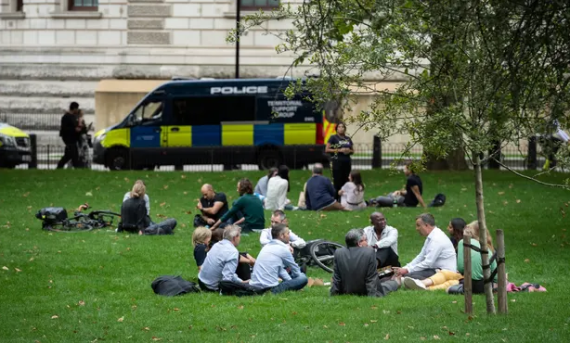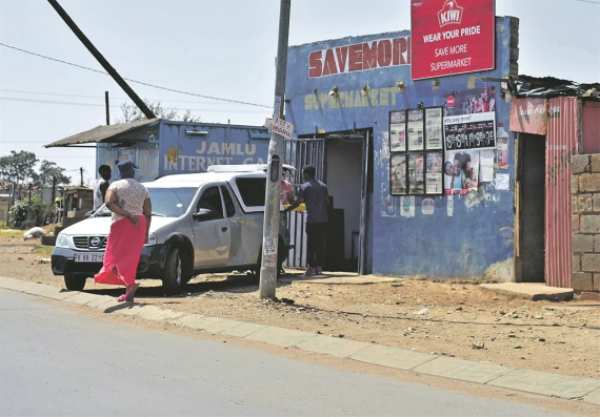People meet in St James’s Park in Westminster. Photograph: Leon Neal/Getty Images
England, Wales and Scotland have introduced fresh limits on social gatherings
What is the ‘rule of six’?
The phrase “rule of six” was used by Boris Johnson in his press conference last week, where he announced a ban on meetings of groups of more than six people in England, applying indoors and outdoors from Monday.
The law replaces existing guidance on no more than two households meeting indoors, meaning that the six individuals can be from up to six households.
Households and support bubbles of more than six people are exempt.
In England, the “rule of six” will not be changed to exempt children under 12, Michael Gove has insisted. Similar rules in Wales and Scotland do not include children under 11 and 12 respectively. But Gove said the England rules were “absolutely right”.
What happens if you break the rules?
Johnson warned that there would be on-the-spot fines of £100, which will double on repeat offences up to £3,200, for those breaking the rules, which he said were to “avoid a second national lockdown”.
Over the weekend, police dispersed a number of illegal gatherings as revellers make the most of the final weekend before the restrictions officially came into force.
Greater Manchester police said they closed down illegal gatherings at properties in Altrincham and Flixton on Saturday night, as well as a large gathering of about 70 people in Mottram. Fixed penalty notices were issued at each of the incidents.
Officers also attended a gathering at an address in Stockport that had 45 people in attendance, and another address in north Manchester to which they had been called on two previous occasions.
Nottinghamshire police issued a teenager with a £10,000 fine for hosting a house party in Lenton attended by more than 50 guests. The force said if the 19-year-old man failed to pay or contested the fine he would appear before a court.
What do the experts say?
Peter Openshaw, professor of experimental medicine at Imperial College London and an adviser to the government on respiratory viruses, said the rules were being introduced in England to avoid another hard lockdown but agreed some of the detail was “irrational”.
Openshaw told Sky’s Sophy Ridge on Sunday programme: “I think people have been complaining widely about the fact that you can carry on doing things like exercising in groups and doing sports and getting together for special events, but yet you can’t have both a grandmother and a grandfather come to visit your home if you’re a family of five.
“It is inevitably going to create those difficulties which are hard to explain.”
But he added: “It is on the other hand very simple.”
How do the rules differ in Scotland?
On Thursday, the Scottish first minister, Nicola Sturgeon, introduced a new limit of six people from two households gathering together, which applies indoors – in houses, pubs and restaurants – and outdoors, including in private gardens.
Any children under 12 who were part of the two households meeting would not count towards the six-person limit, and there is a limited exception for weddings, civil partnerships and funerals.
A complete ban on private indoor gatherings continues to apply in six council areas in the west of Scotland – East Dunbartonshire, West Dunbartonshire, East Renfrewshire, Renfrewshire, Lanarkshire and Glasgow City – where there has been a surge in infections in recent weeks.
Does six only apply to indoor gatherings in Wales?
Yes, Wales is to limit the number of people who can meet indoors at any one time to six from Monday, excluding children under 11, and all must belong to the same extended household group.
There are no changes to the rules on meeting outdoors. Gatherings of up to 30 people are permitted outdoors in Wales. But people should continue to maintain physical distancing from people outside their household or extended household.
These changes will not apply in Caerphilly county borough council area, where local restrictions have been introduced.
How about Northern Ireland?
Northern Ireland has not announced any changes to how many people can gather. But localised coronavirus restrictions are to be introduced in Belfast and Ballymena.
People from two or more households in these areas will not be able to meet in private settings. There are a number of limited exceptions, including childcare provision and households that have formed a social bubble with another.
No more than six people, from no more than two households, will be allowed to meet in private gardens.
Where can I find more information about the latest changes?
Here is updated guidance for England, Scotland, Wales and Northern Ireland.
Since you’re here ...
… joining us from South Africa, we have a small favour to ask. Millions are flocking to the Guardian for open, independent, quality news every day, and readers in 180 countries around the world now support us financially.
We believe everyone deserves access to information that’s grounded in science and truth, and analysis rooted in authority and integrity. That’s why we made a different choice: to keep our reporting open for all readers, regardless of where they live or what they can afford to pay.
The Guardian has no shareholders or billionaire owner, meaning our journalism is free from bias and vested interests – this makes us different. Our editorial independence and autonomy allows us to provide fearless investigations and analysis of those with political and commercial power. We can give a voice to the oppressed and neglected, and help bring about a brighter, fairer future. Your support protects this.
Supporting us means investing in Guardian journalism for tomorrow and the years ahead. The more readers funding our work, the more questions we can ask, the deeper we can dig, and the greater the impact we can have. We’re determined to provide reporting that helps each of us better understand the world, and take actions that challenge, unite, and inspire change.
Your support means we can keep our journalism open, so millions more have free access to the high-quality, trustworthy news they deserve. So we seek your support not simply to survive, but to grow our journalistic ambitions and sustain our model for open, independent reporting.
If there were ever a time to join us, and help accelerate our growth, it is now. You have the power to support us through these challenging economic times and enable real-world impact.
Article Source: https://www.theguardian.com/world/2020/sep/11/the-rule-of-six-what-are-the-new-uk-coronavirus-rules





